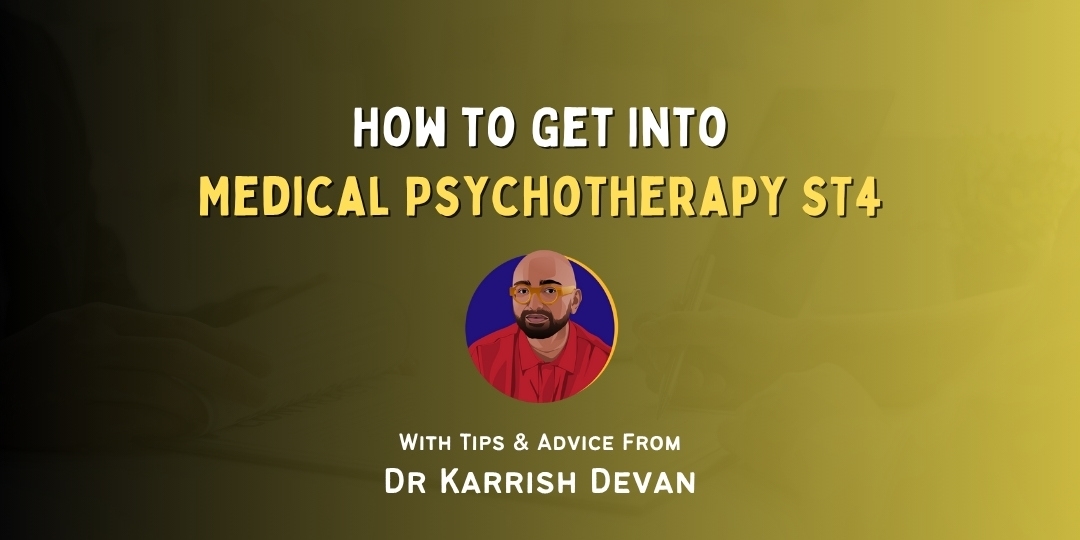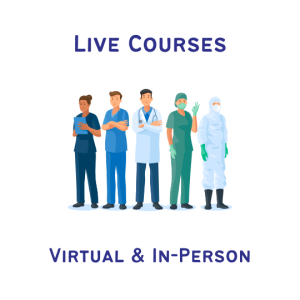
Published October 24, 2025 | Updated October 24, 2025
By MedCourse
Useful, relevant, and interesting content for UK Junior Doctors.
About the Author

Karrish Devan, Medical Psychotherapy Higher Psychiatry Trainee – Tavistock Training Scheme, London.
The journey to Higher Psychiatry training involves completing foundation year training and then applying for three years of core training. After this, you can apply for a single higher training sub-speciality (3 further years of training) or dual, where you complete two sub-specialities (5 further years of training). After this, you qualify as a Psychiatric Consultant.
I am currently a Higher Trainee in the subspecialty of Medical Psychotherapy. There are only a few of us across the country (under 100), and it is a highly competitive speciality to enter. As a Medical Psychotherapy trainee, we are trained in different modalities of therapy and we learn how to provide this for patients and supervise other staff. The main types of therapy we are trained in are: Psychodynamic, Cognitive (i.e., CBT), and Systemic (i.e., Family Therapy), although these vary across the country. The benefit of applying for this scheme is that these trainings are included in your job plan, and it is often free or heavily discounted.
Courses & Conferences to Attend
There are two conferences I would recommend, both run by the Royal College of Psychiatrists. One is entitled the ‘Trainers and Trainees conference’ and the other is the ‘Medical Psychotherapy conference’. Each is affordable for juniors/students and can often be claimed back on the study budget.
Consider entering an essay prize by the Royal College of Psychiatrists or Balint society – these are good for networking and your portfolio.
Firstly, I would recommend finding your deanery’s Medical Psychotherapy Tutor. Often, the easiest way to get their contact details is to email your Medical Education department. Organise a meeting with the Tutor and they will be able to tell you of the local courses/conferences available. In London, for example, this is often the ‘Introductory Lecture series’ and ‘Foundation Course’ run by the Institute of Psychoanalysis.
How to Maximise Your Portfolio
As mentioned above, Medical Psychotherapy is incredibly competitive, but frustratingly, the way that applications are scored often changes year by year. There are some core areas to focus on, however academic achievements, leadership/management, and teaching.
Academically, you will always get the most points if you have two+ articles published as a first-author. Speak earlier to your CS/ES about this, and they will be able to put you in touch with academics in your area. Make it clear to them what you need for your portfolio. Leadership and management skills can be obtained by taking on roles in committees, but remember to get a consultant/senior to give you evidence of this role. Teaching is a core area to focus on, too; you need to provide regular teaching and have feedback. Speak to your Medical Education department to see what the opportunities are and if they will fund/support with Teach the Teacher or PgCERT courses.
Making the Most of Your Day Job
If on a non-psychiatric day job, the best thing to do is build up a connection with your local psychiatry team – psychiatrists of all specialities are very friendly and will be keen to help you organise Shadowing days/Taster weeks.
Get involved in any QIP/Audits related to Mental Health on the Medical wards (i.e., delirium/staff burnout, etc.) and then present these at a Psychiatric Conference.
Focus on networking and building up communications with Psychiatrists and trainees in your local area.
If struggling, consider speaking to your local Geriatric Medical team; they will have mental health-related projects (I.e., dementia audits, etc) that can be very good for your CV.
Making the Most of Medical Psychotherapy Placements
If your interest is in Medical Psychotherapy, then speak to your consultant about it and get the details of your local Psychotherapy Tutor
Enter essay competitions and conferences – network and meet people.
Another important factor for ST applications is leadership and management skills. See if you can get onto your local Junior Doctors’ Committee whilst working in Psychiatry, or take on a similar role to build experience.
Make sure you get these achievements signed off by a consultant/senior for your portfolio (and keep every certificate)
What About Non-Medical Psychotherapy Placements?
I would recommend getting experience in Psychiatry before applying for any specialty. There are many very good Trust Grade jobs (including study leave/access to teaching, etc), which I would prioritize applying for over Agency Locum jobs.













